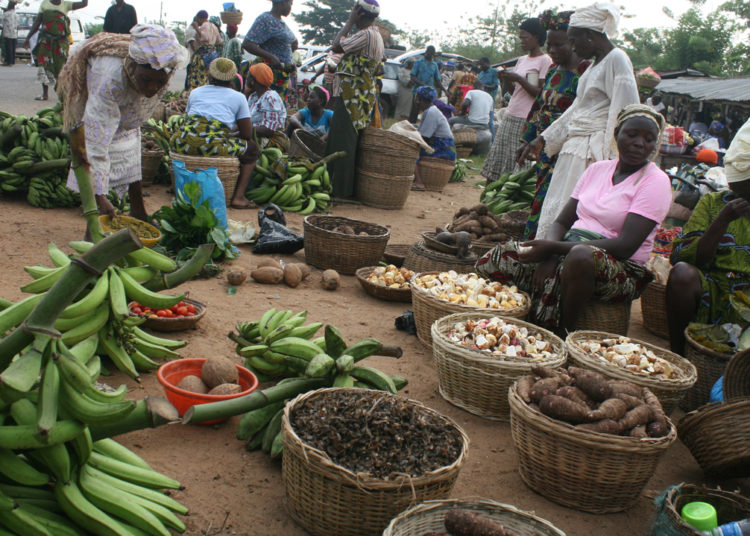Nigeria and 44 other countries around the world are severely exposed to the impact of the Ukraine-war induced food crisis, according to a study by Boston Consulting Group (BCG), a leading global management consulting firm.
This is contained in a new report from Boston Consulting Group (BCG), titled The War in Ukraine and the Rush to Feed the World, which explores in detail the multiple direct and indirect impacts of the turmoil in Ukraine on global food systems.
The BCG report co-authored with Food Systems for the Future also provides 30 near- and medium-term solutions to help respond to the crisis and improve the resilience of global food systems.
It said the affected countries concentrated in Africa, South Asia and Latin America, were hotspots around the world as they were enduring some of the worst effects of the crisis.
According to the BCG report, Nigeria and the other affected countries face severe levels of extreme poverty, compounded by the ongoing economic and social challenges associated with the COVID-19 pandemic.
Additional factors worsening the food crisis identified in the report include heavy reliance on food imports, high import bills, high inflation, a high debt burden, climate risks, and civil unrest.
An estimated 1.7 billion people — most of them in developing economies — could suffer severely increased food insecurity, higher energy prices, or greater debt burdens, according to the UN Task Team for the Global Crisis Response Group.
tors adversely affects people’s ability to feed themselves. At the same time, there is a critical need to address them more holistically and across all sectors in order to reshape our food systems so that we can counteract this humanitarian crisis — and future ones.
Managing rirector, and Partner at BCG Nigeria, Stefano Niavas, while commenting on the findings, said, “The impact of the Ukraine war on our food systems calls for critical and immediate review of our budgetary allocation. Currently, Nigeria spends over 27 times of its Agriculture allocation to service its debt. Compounded with the Ukraine war and the lingering challenges of COVID-19, the average ddebt-t-GDP ratio across the continent is expected to rise from 60 per cent to 70 per cent.
To minimise the impact of the crisis on Nigeria’s food systems, the government and all critical stakeholders should ensure stabilising the rising cost of food and fertilizer by the provision of viable seedlings, supporting the growth of alternative nutritious grains, driving the adoption of innovative farm practices. The introduction of alternative sources of fertilizer will help reduce the country’s reliance on food imports.”
Together, Russia and Ukraine account for about 12 per cent of the total food calories traded around the world, and both are critical exporters of key commodities such as wheat (28 per cent of global trade) and sunflower oil (69 per cent), according to the International Food Policy Institute. The UN’s World Food Programme (WFP) buys from Ukraine half of the wheat it distributes around the world. Further, as exports from these countries tumble, some other leading exporting countries have announced export bans or licensing restrictions designed to protect their own food stockpiles.
As a result, prices are skyrocketing—not just for food, but also for essential agricultural inputs, such as fertilizer and fuel, that Russia has long been a key supplier of. Moreover, the ripple effects of disruptions to the fertilizer supply chain will reach consumers worldwide.
Making matters worse, the current crisis coincides with high debt levels in many developing economies around the world. Largely due to public spending to address the challenges presented by COVID-19, about 60% of low-income countries are currently in, or at high risk of, debt distress, compared with just 30% in 2015, according to the International Monetary Fund (IMF).
“While this crisis will impact all of us around the world in significant ways, low-income economies risk devastation and potential unrest,” said Ertharin Cousin, CEO and founder of Food Systems for the Future, and a coauthor of the report. “We’re not just talking about the poorest of the poor, who are already suffering from hunger. We’re also talking about people who could recently afford a loaf of bread for their families and who now will literally be unable to do so.”
Relieving the current crisis requires, most importantly, a coordinated and immediate emergency humanitarian response by all stakeholders—governments, development institutions and banks, NGOS, and private companies—to meet the most pressing needs for humanitarian aid. They must provide not only food and financial support, but also the seeds, inputs, tools, and technical assistance needed to support in-country sustainable intensification and other crop substitution actions. The report outlines a solution set of 30 key recommendations for all stakeholders.
“There is a lot of talk about the individual components of the crisis, but it is critical that we look at things holistically and recognize the interdependence of factors ranging from rising costs of food, fertilizer, and fuel, to maxed-out debt, climate-related issues, ongoing conflicts elsewhere in the world, and COVID-19. There are multiple prongs of failure at risk of being tipped over by Russia’s invasion of Ukraine,” said Shalini Unnikrishnan, a managing director and partner at BCG, the global leader for Food and Nature in the firm’s Social Impact practice, and a coauthor of the report.
“Just as critically, we need a coordinated effort across all sectors to rethink and repair our food systems, making them more equitable, more resilient, and more responsive in times of great need,” Unnikrishnan continued. “Avoiding more such crises will require diversifying food production across diets, supply chains, and markets, and addressing the indebtedness, economic inequities, and market distortions that have contributed to the current crisis.”





